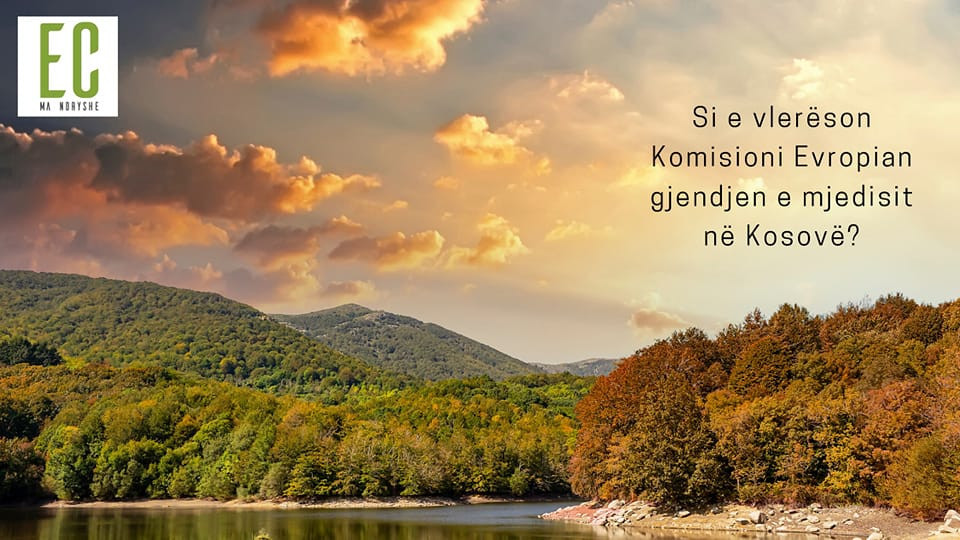How does the European Commission assess the state of the environment in Kosovo?

The European Commission has published the Progress Report for Kosovo, where in the context of environmental issues, it has highlighted positive assessments, challenges, setbacks and issues that need to be addressed in order to further improve the environmental situation.
This report assesses that Kosovo still remains at an early stage of preparation for the environment and climate change, and that limited progress has been made in this area. According to EU recommendations, Kosovo should increase political commitment to address environmental degradation and significantly improve the implementation of legislation by harmonizing it with the Green Agenda for the purposes of the Western Balkans.
Air quality continues to remain this year an actuality that belongs to the serious situation, being considered as a great threat to health.
Although the detailed identification of the sources of air pollution has been completed, Kosovo has failed to implement corrective measures to curb pollution, the report states. In June 2022, Kosovo adopted the Law on Air Pollution Protection. This law aims to define the competences and responsibilities of institutions to ensure the right of citizens to live in an environment with clean air, protecting human health, fauna, flora and the natural and cultural values of the environment from air pollution. https://gzk.rks-gov.net/ActDetail.aspx?ActID=2669&fbclid=IwAR0FDihaKENXf-JjdaP6rSdwfO9ocS1sFLCNlcdbLA3xlrVYydjvq5BTqEM
However, the applicability of this law continues to remain fragile and Kosovo continues not to implement the ban on coal for heating. It is more urgent for our country to start investing in other forms of heating, since in this way a huge burden that is causing air pollution would be removed from Kosovo's shoulders.
Within this report, waste management is also elaborated. In Kosovo, most of the waste still ends up in landfills that are not properly managed or are categorized as illegal landfills. This means that, despite the continuous commitment, illegal landfills continue to be a challenge that must necessarily receive urgent treatment.
Moreover, the report states that the instability of their management system still remains current. The Assembly belatedly adopted the "Law on Waste" in August 2022, harmonizing Kosovo's legislation with the framework directive on waste.
However, Kosovo needs to increase capacity at all levels and set realistic targets and timelines to ensure effective implementation of integrated waste management and circular economy, this report states. The improper management of waste in Kosovo is causing chain problems which are showing their impact on many ecological levels, even in most cases causing irreversible damage, so the solution must be urgent, because it is already overdue.
Regarding the harmonization of water legislation with the EU acquis, Kosovo has made some progress. The level of alignment and the monitoring mechanism of the Water Strategy 2017-2036, as well as the implementation of the water law, however, remain insufficient. Surface water quality monitoring is satisfactory, while the underground water resource monitoring network is incomplete. The planning and construction of wastewater treatment plants in major cities showed significant progress, the report said.
In a research carried out by EC Ma Ndryshe (Environmental Sector Monitoring - 2021) it is stated that currently functional plants for the treatment of polluted water are the sewage treatment plant in Skënderaj with an annual capacity of about 734,421 m3, as well as 2 plants (Harilaq and Badovc) with small capacity (104,750 m3/year).
https://www.ecmandryshe.org/repository/docs/220805044520_ADMINISTRATA_QENDRORE___finale.pdf?fbclid=IwAR2YKCGcyCmrPRpkop7n6ZEBNP_Oz5tMsIwpVsXf3vwXi-EZU8aYyADnQu0
For the region of Prizren, the construction of such a plant has already been completed, while in Pejë the wastewater plant was inaugurated last week.
In the progress report, the Strategy for Environment and Sustainable Development 2022-2031, which has not yet been approved, is elaborated. The detailed regulatory plans for both National Parks have been re-drafted into partial plans covering smaller areas. On the other hand, the Action Plan for Biodiversity 2016-2020 is still partially implemented because the defined areas continue to be polluted and illegal activities continue to take place: such as hunting and deforestation.
As for the Climate Change Strategy 2019-2028 and the Action Plan for the period 2021-2023, they are estimated to be very limited. The climate change law has not yet been approved, while the National Energy and Climate Plan is also facing serious delays. Kosovo continues to support a lot of coal, which means that it is not in line with the emission limits set according to the National Emission Reduction Plan, which aims to gradually reduce emissions of sulfur dioxide (SO2), nitrogen oxides (NOx ) and fine dust (PM). https://bit.ly/3DaZTeL
Although Kosovo has taken steps to begin the inventory of natural habitats and species, the determination of potential "NATURA 2000" sites is still at a very early stage. Otherwise, "Natura 2000" is a European network of protected nature areas which aims to ensure the long-term survival of Europe's threatened species and habitats.
https://ec.europa.eu/environment/nature/natura2000/index_en.htm?fbclid=IwAR1yvmwjL9cF5QHXPaeQm2tUuikMhw8VvZvRsddBzVkPifG-MjumZubc6P8
Most of the previous recommendations from such a report have not yet been implemented. Therefore, in the next year, according to the EU, Kosovo in particular should:
• increase the coverage of waste collection, apply eco-friendly principles: reduction, recycling and reuse of waste,
• to harmonize and start the implementation of legal provisions on environmental responsibility, damage and crime; implement the polluter pays principle and raise public awareness on environmental protection;
• implement the climate change strategy and the Climate Change Action Plan, prepare the roadmap for alignment with the Green Agenda for the Western Balkans and adopt a National Energy and Climate Plan, in line with the Energy Community, and finalize the drafting of long-term decarbonization strategy.
While EC also recommends that:
• To treat environmental issues in Kosovo with priority, including efforts to raise awareness among citizens about the importance of environmental protection, as well as to intensify commitments regarding the harmonization of legislation with EU directives.
Link: https://www.facebook.com/ecmandryshe/posts/pfbid02pjauamySHGnX4nsDQwEMasDWwvAvRyHiYymKK1LFpXbiFMfZaTSCoWMUsS5CjfJKl
Regarding the use of public/urban transport, EC Ma Ndryshe has conducted the research "How much is urban transport used in Prizren?". Through this research, it is intended to evaluate the impressions of the citizens regarding the urban transport service, their demands and their needs.




